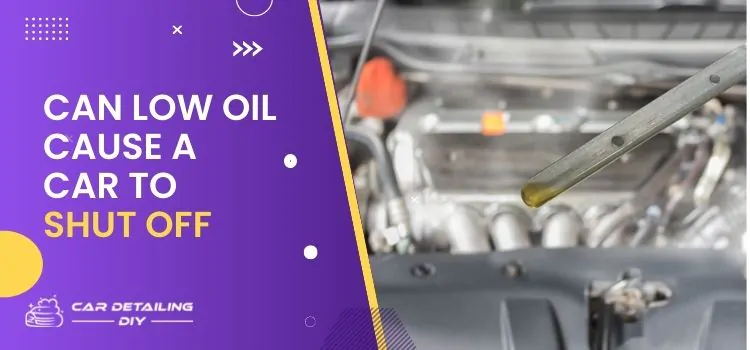According to auto detailing experts, the purest oil acts as the engine’s lifeblood. Just as blood is necessary to the body’s life, similarly, a car engine’s survival is impossible without the oil. It gives life to the engine and makes it durable for many years. While driving a car this questions usually comes in mind that can low oil cause a car to shut off?
Many metal moving parts inside the engine move rapidly and ensure the smooth running of the car. These moving parts touch each other when they are moving and produce friction. The friction causes heat. Combustion inside the cylinders of your car’s engine, which runs the car engine, produces heat too.
The faster you drive the car, the faster the engine’s metal parts move and produce a lot of heat. So, you need engine oil to reduce heat and friction amongst the parts of the engine.
Engine oil keeps the metal moving parts of the engine cool and reduces friction for smooth functioning of the engine. Without the oil, your engine becomes a useless block of metal. A low oil level can cause the engine to shut off. A severe oil shortage can cause the engine’s death, so you need to replace it.
Let’s move to the answer of this question.
Can Low Oil Cause a Car To Shut Off?
Yes, low oil can cause a car to shut off, even seizing the engine and making it useless. All the cars of this century have sensors to detect low oil levels or oil pressure in car engines. These oil level sensors shut off the car’s engine in case of insufficient oil level or pressure to prevent your engine from any severe danger.
How Does Engine Oil Work?
Engine oil provides lubrication to the moving parts of the engine. When oil is pumped into the parts of engines with pressure, it provides lubrication by making a particular lubricating film over all the metal parts. This unique lubricating film leaves a slippery surface on all metal moving parts and reduces the friction when they touch each other while operating.
Engine oil travels around all parts of the engine and absorbs the heat produced in case of friction. When oil arrives in the engine sump, it gets cooled by the external air that travels over the surface of the sump. This same phenomenon happens many times in the engine to keep it cool while you are driving the car.
Can Low Oil Cause a Car To Stall?
Yes, a low oil level in the engine can cause a car to stall. It can stall your car anywhere, even in emergencies. Automobile experts say that the oil level sensors can automatically shut off the engine if they find low oil or pressure levels without allowing the engine to go in severe conditions. This shutting off the engine causes a car to stall anywhere, even in sensitive places. So, always check the oil level before setting for the long drive.
Can Low Oil Cause a Car Not To Start On The Way?
Yes, low oil can cause a car not to start even if you are in an emergency. It happens only when you continuously ignore the red oil pressure light on your car’s dashboard and don’t stop your car immediately. Red oil pressure light appears on the dashboard only when the car’s engine faces a shortage of oil to extreme levels.
If oil level sensors don’t stop your car even at a deficient oil level, it can cause the death of the car’s engine and make it useless.
Will Low Oil Cause Overheating?

Yes, low oil in the engine will cause overheating. As we have discussed earlier, engine oil absorbs the heat produced by the rapid movements of metal parts inside the engine. Moreover, it also reduces the heat by reducing the friction among the engine’s moving parts due to its lubricative action.
So, when there is low oil in the engine, it will cause overheating inside it.
What To Do When a Car is Low on Oil?
Before getting know the answer to this question, it’s essential to know: How to check the oil level in a car’s engine?
How To Check The Oil Level in a Car’s Engine?
Consider a dipstick as an ‘oil meter’ to check the oil level. Dipstick marked with two lines. One is “full,” and the second is “add.” when you need to check the oil level, pull the dipstick out, clean it and re-insert it. Then again, pull it out and check the readings on it. If the dipstick remains dry, you must add oil to the engine.
Now, let’s move toward our main question.
What To Do When a Car is Low on Oil?
If a red engine oil warning light appears on your dashboard, you need to add synthetic oil into the engine until it gets filled. Moreover, take your car to the workshop and let the mechanic check the damage. Repair all the damaged parts before letting the whole engine to destroy.
Conclusion
Low oil can cause cars to shut off and can even cause the death of a car’s engine. Automobile experts always recommend changing your car oil and checking the oil level once a month to keeps your engine performing smoothly.
It may be hard to do, but it ensures the car’s safety against severe damages that can cause a massive and unnecessary repair bill for you. Always use suitable synthetic oil that is alright for your vehicle. You can find out about it in the engine oil guide or by consulting your car’s mechanic.
FAQ’s:
Why is Synthetic oil better than conventional engine oil?
Synthetic oil is better than any conventional engine oil. It offers numerous benefits such as unbelievable protection to the engine, increased engine efficiency, and retains its qualities even at high temperatures.
Will low oil pressure cause a vehicle not to start?
The primary function of oil pressure is to provide lubrication to the engine’s moving parts. So, low oil pressure in the engine causes friction amongst the parts, and the friction produces overheating. This overheating shuts off the engine, and doesn’t allow it to start again.
What are the signs that low oil might be causing my car to shut off?
Look out for warning indicators on your dashboard, such as the oil pressure light or the check engine light. You might also notice odd engine noises, reduced power, or even your car stalling or shutting off unexpectedly.
Can I restart the car immediately after it shuts off due to low oil?
It’s recommended not to. If your car has shut off due to low oil, it’s important to give the engine some time to cool down before attempting a restart. Continuing to run the engine with insufficient oil can cause more harm.
How often should I check my oil level?
Regular oil level checks are crucial for maintaining your car’s health. It’s generally recommended to check your oil level once a month, especially if you notice any unusual signs like engine noise or warning lights.
What can happen if I ignore low oil levels?
Ignoring low oil levels can lead to severe engine damage over time. The lack of proper lubrication can cause parts to wear out, seize, or even break, resulting in costly repairs or even the need for a new engine.
Regular maintenance is key. Follow your car manufacturer’s recommended oil change intervals and check the oil level routinely. If you notice any warning lights or unusual symptoms, consult a mechanic to diagnose and address the issue promptly.
Remember, your car’s engine is a complex system, and proper maintenance is essential for its longevity and performance. Don’t overlook the importance of maintaining adequate oil levels to prevent unexpected shutdowns and expensive repairs.


Comments are closed.